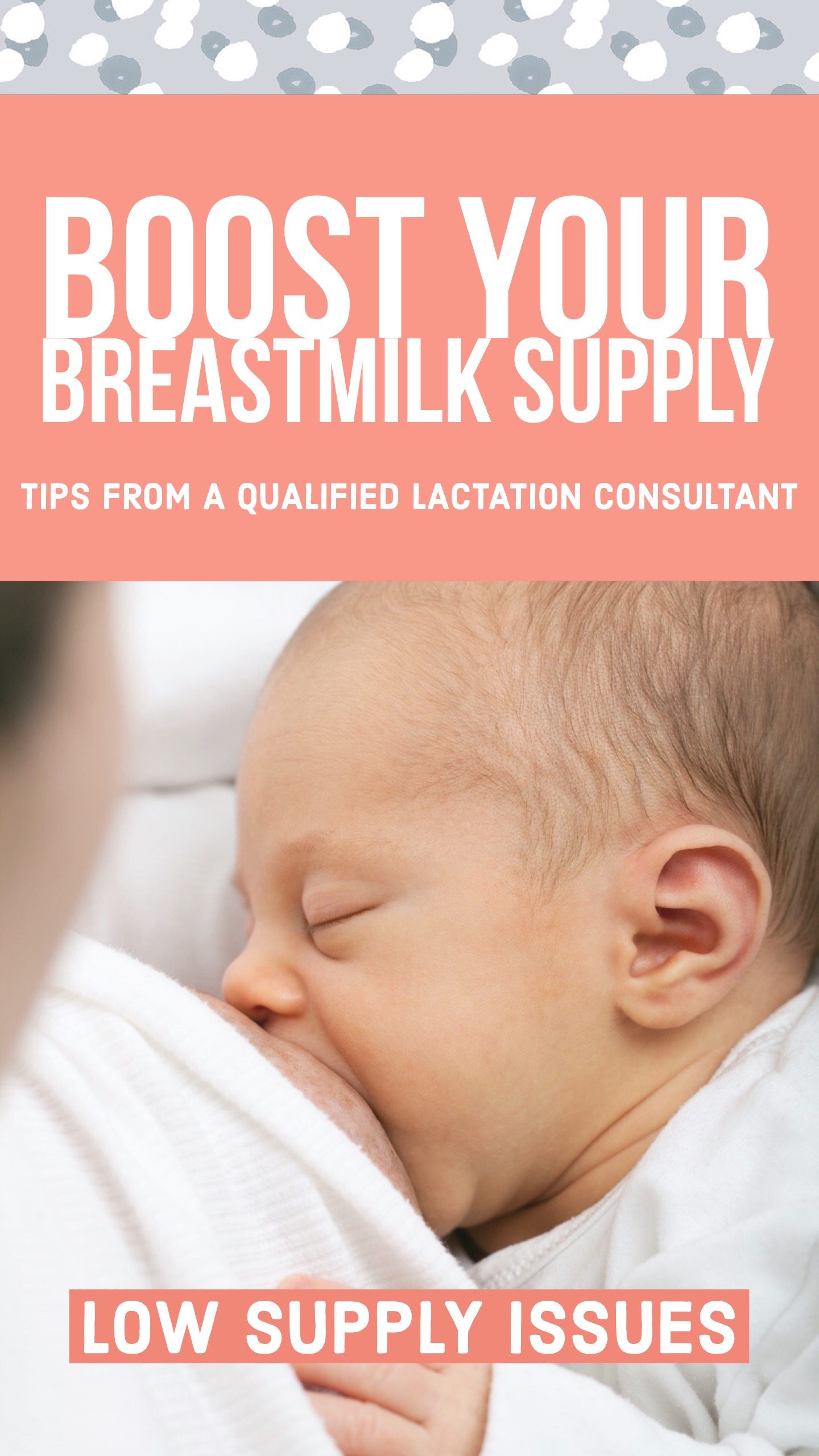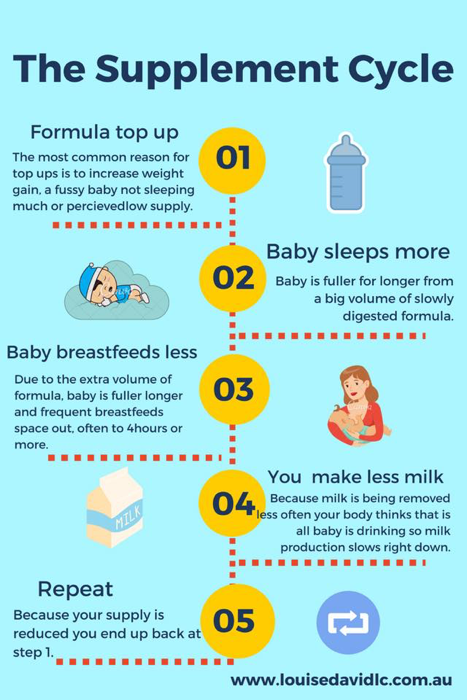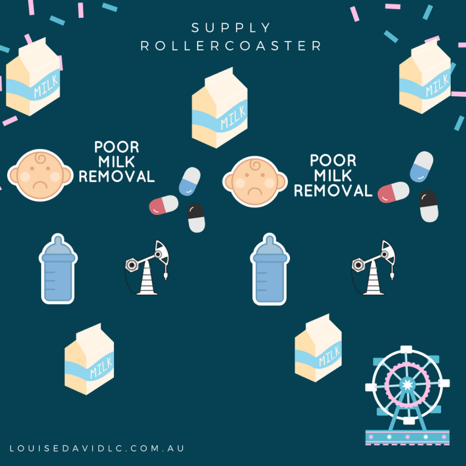An overseas family holiday had long felt like a pipe dream. With young kids,…

Many women can suffer with low supply issues and this can make breastfeeding become difficult and anxiety inducing! When I had my first born Harper I hired a lactation consultant; Louise David who is the Boobie Milk Guru! I asked Louise to share the tricks when it comes to upping your supply!
*This blog was written by Louise David
You’re Breastfeeding AGAIN. Your baby wont sleep more than 40 minutes. Your breasts are soft and
feel empty. “Am I loosing my milk?”
One of the most common reasons given for ceasing breastfeeding is that mums feel they do not
have enough milk. This can be at any stage of the breastfeeding journey, either early days, “my milk
never came in” or later months as babies behaviour changes, “my milk dried up”.
Milk production can be delayed in onset or reduced at times but with proper understanding and
management it doesn’t have to result in ending your breastfeeding relationship.
I’m going to put to you a plan that can help you through the anxiety and stress when you may be
thinking that you may have a low milk supply. Let me say my approach isn’t anti formula, it is about
education and understanding, but ultimately giving you the confidence to know that YOU know best
and to do what feels right for you and not what you have been told to do, or else.
Before you go reaching for the bottle of formula to start topping up your baby you need to know
what the hell is going on. The first thing I ask a mum when she says to me I don’t think I have enough
milk is, “Why? What makes you think that your milk is low”. This is most commonly answered with,
She feeds constantly, won’t settle or is growing too slowly. After a good chat and observing a feed,
and undoing some poor advice, I have most of these mums leaving my office feeling reassured that
they are absolutely doing great and their baby is thriving. So let’s take a look at some of these things.
Frequent feeding
Lack of understanding about normal newborn behaviour can set new mums up for a lot of heart
ache. A long standing culture of bottle feeding in our society has lead us to believe that babies eat
every 4 hours and sleep a good chunk in between. For breastfed babies who are fed according to
need (aka “on demand”) feeding every 4 hours is actually very abnormal. The norm is feeding
upward of 8 to 20 times in a day. The best answer a mum could give to me when I ask “how often
does baby feed?” is, “I don’t know? When ever she wants”. I could go into masses of detail about
supply and demand and milk production but Google will serve you well there. I will say that breast
capacity is something that helps you understand a bit more about feeding frequency. If you have
small capacity to make milk, your baby will want to feed a lot to be content and satisfied. The next
mum who has busting milk machines may only need to feed her baby as little at 5 or 6 times a day.
We are all different. Read more on breast capacity and frequent feeding here.
Unsettled and not sleeping
If there is one thing my children have taught me is how little sleep babies need to function. Wakeful
babies are common and just because they sleep little it doesn’t mean they aren’t eating enough or
there is something wrong. Often babies who sleep well at night make up for their milk intake in the
day feeding very frequently between cat naps. It’s a trade off for the sleep they’re giving you at
night… take it! The most common complaint is that baby will sleep in my arms but have some ninja
like sense to burst into high alert as soon as you slip them down. This is because they are clever little
beings. They know that your arms are the safest warmest place where his needs can readily be met.
After all he is a little animal, a cave baby who thinks you’ve just put him down in a cave and is crying
for you to pick him back up before a lion comes to eat him. He doesn’t know you’re just trying to get
the washing hung out. Be reassured if he’s happy and just isn’t a fan of much sleep, he’s not broken.
Your only job for now is to respond to his needs.
Growth
Don’t let the scales freak you out! The numbers (shakes head), some health care professionals are
obsessed with the numbers on the scale and if your baby isn’t fattening up like a baby hippo they
will have you doubting yourself and comp feeding with formula before you can say “kick backs from
nestle”. The fact is, numbers are a guide. They also are not a one size fits all. The best guide for
Infants growth is based on the world health Organisation (WHO) growth standards. The Australian
Breastfeeding Association (ABA) has a great information page on this here. The average, repeat
AVERAGE weight gain is per week for a breastfed baby up to about 3-4 months is around 120g to
150g. I am hearing now, more and more often completely arbitory numbers being pulled out of
nowhere by Gp’s, paediatricians and child health nurses all over. Mums tell me they were advised to
begin top up formula because baby didn’t gain 200g this week, or conversely told baby is feeding too
much and therefore must have limited breastfeeds because they gained that same 200g number.
Seriously WTF? If you have been made to feel uncertain about your babies weight gain seek skilled
lactation help immediately and you will likely learn you are absolutely on the right track or
otherwise, a breastfeeding friendly plan can be implemented and you and baby supported through
the hurdle.
Finally and this can’t be emphasised enough; YOU are the expert on your baby. If you know all is
well, go with that, by all means seek reassurance by a lactation expert, but don’t let your faith in
your instincts be compromised. You know baby is giving wet heavy nappies, she is content and is
growing; this week is nappies are tighter, her toes reach the end of her onsie. You know, all is ok.
Still not convinced?
So, you’ve had a good think about it, you’ve worked with some one who has answered your
questions and more importantly listened to you. You come to the conclusion that making more milk
may be helpful, may be the answer you’re looking for…How do I make more milk?
Breastfeed more:
Breastfeeding and rules do not go well together. But, there is one thing I will say cannot be disputed.
To make milk you must remove milk! When the breast is low in volume because of frequent milk
removal the body thinks “crap, baby is drinking all this, I got to get producing”. Now, beware the
trap of the supplementing cycle. This is the main thing that will undo your breastfeeding, it only
leads to less breastfeeding and therefore less milk. Not to mention the mental and physical torture
of breastfeeding, bottle feeding, pumping… repeat. Don’t over think it. Put baby to the breast, again
and again. Know there is a top up there IF you need it. Just knowing it’s there is reassuring in its self.
Let baby feed and feed as much as he likes. Theres no time to pump now? Good, baby just feeds,
baby is the pump and is getting his top up, at the breast. If baby is now seemingly too hungry after
all morning of breastfeeding or you feel like “Get the hell off of me!!!”, give him his top up. Reset,
rest, and come back to breast next feed. In this approach you can wean very quickly from 6 and 8
formula top ups a day to 2 or 3 and then 1 and none. Give yourself permission to sit and feed,
AGAIN.
Lesson: take milk out, make more milk.

Pumping:
Perhaps you picked up on my feelings about pumping above; I don’t care much for it. Perhaps it’s
because I lived on a pump for 9 weeks straight when my twins were born premature and couldn’t breastfeed yet. Pumping is clearly is important in some cases, but, in terms of making more milk, it
really is not the most effective tool or enjoyable experience.
Most mums will claim distain for their pump, a feeling made even worse when all you are rewarded
with is a dribble in the bottom of the bottle. Above we learnt taking milk out is what makes more
milk. A baby is more efficient at this than the pump, it takes the same time, its equipment, cleaning
and storage free, and is a top up at the same time.
Important: If baby is not taking milk from the breast for any reason, the pump must do the job or
your body will think baby doesn’t need this milk it has been making and will slow it all down.
Lactation cookies:
Mums swear by them. Mums report that they were feeling that their supply was low and after a day
of munching on cookies they felt like they were right back on top of the game and more.
There is no evidence if these baked treats of goodness actually work. However, historically and
anecdotally the ingredients in them have been used to increase milk supply to varying degrees of
effectiveness for hundreds of years.
My take, maybe they do work? My gut/experience tells me they are more likely a placebo effect.
Where perhaps there wasn’t a genuine low supply, babies behaviour can be explained by something
else (or normal breastfeeding baby behaviour) and mum “doing” something about it makes it all
appear better.
If it is a placebo effect, who cares? It helps, that’s all that matters. Oh, and they taste amazing.
*Steph uses the amazing range of lactation cookies and capsules from Renee’s Goodies. Click here to check out Renee’s Goodies

Fenugreek:
Fenugreek is a herb that works very effectively to increase milk supply. The effective dosage is
actually quite high; more than a couple of cups of tea or seeds can give. On that note, if the tea or
seeds are working for you, awesome, I think it may be working like I explain how the cookies do above. Seek advice from your health professional on dosage advice for fenugreek tablets, it’s not necessarily what is on the bottle.
When I studied for my IBCLC I remember doing a paper on the effectiveness of fenugreek for increasing milk supply. Excuse that I can’t remember any resources, but I concluded that fenugreek alone, taken in appropriate amounts significantly increases milk supply, where in 75% of cases women were able to return to exclusive breastfeeding.
In my experience, mums who take it appropriately, notice an increase in supply by about 12 to 24 hours of starting fenugreek.
FIY: We generally say you’re taking a sufficient amount if you start to have a bit of a curry like scent about you, or your wee smells like maple syrup. (mmmm)
Prescription medication:
Most mums and health professionals kind of view this as a last resort option. I do agree in that if the baby is breastfeeding well there shouldn’t be a supply problem. So if exert breastfeeding advice has been sought and first line strategies haven’t seemed to help, medication is an appropriate next step.
The drug of choice used to increase supply is Domperidone (brand name mottilium), as a side effect of the drug, prolactin in the piturity gland is increased and therefore the breast creates more milk. The supply increase can be a little more subtle at first (than the fenugreek) but over a couple of days mum should notice a difference to how her breasts feel and observe better drinking by baby.
This drug is generally well tolerated without major side effects and some mums stay on it quite long term. It requires a prescription from your GP, some GPs may not be familiar with it being used in this capacity; however there is loads of information online you can arm yourself with and share with your GP.
As a final word I think the most important take away is that low milk supply is not normal. There is always a reason for it and it’s getting to the bottom of it to make sure you can resolve it quickly and avoid it happening again. The key to the milk increase you get from any of these methods being maintained is continued milk removal. So if you don’t have effective milk removal by baby in the first place you may find yourself on a roller-coaster of not enough milk, work your butt off to get it back and then it drops all over again. Your best bet to come out the other side still breastfeeding and loving it is a supportive lactation expert, your friendly neighbourhood IBCLC.

If you would like to get further information or if you acquire Louise’s assistance please check out her website here for more information
- 23Shares



